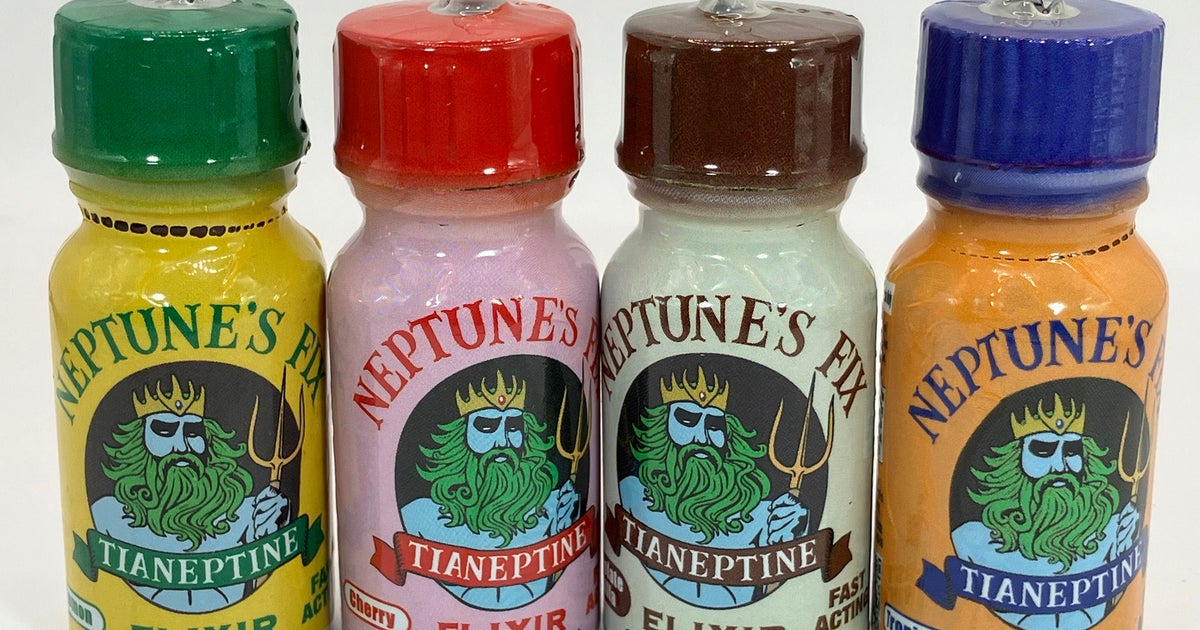Neptune’s Fix products sold nationwide are being recalled because they contain tianeptine — also known as “gas station heroin” — a substance linked to addiction and deadly overdoses.
All of the brand’s products — including Neptune’s Fix Elixir, Neptune’s Fix Extra Strength Elixir and Neptune’s Fix Tablets — are being recalled because of their use of tianeptine, the company behind the brand, Neptune Resources, said Sunday in an announcement posted by the Food and Drug Administration. The agency hasn’t approved tianeptine for medical use.
The FDA advises a “reasonable probability of life-threatening events including suicidal ideation or behavior for children, adolescents and young adults 25 and younger,” with further risks including unintentional overdoses, Neptune said. Tests of bottles branded as Neptune’s Fix have also turned up mind-altering substances mixed in with the tianeptine, including synthetic cannabinoids – manmade versions of marijuana’s main ingredient.
“Several bottles of Neptune’s Fix were tested. Substances identified included tianeptine, kava, two synthetic cannabinoids and two plant cannabinoids,” Alicia Gambino, a spokesperson for the New Jersey Poison Control Center, said in an email.
“Happiness in a bottle”
Neptune’s Fix had been marketed by the company as “happiness in a bottle” with effects “superior to Kratom.” While some other countries have approved tianeptine as a prescription drug for anxiety and depression, the FDA has not greenlighted its use.
The recall follows multiple FDA warnings to the public about the Neptune brand as well as other products containing tianeptine, with reports of bad reactions involving the drug on the rise in the U.S.
For its part, Neptune Resources has urged the FDA to crack down on counterfeits mixing in other drugs beyond tianeptine, which it claims are to blame for the recent increase in seizures and hospitalizations reported from use of its products.
In its recall announcement, Neptune Resources said its bottles were only sold in amber glass vials with “shrink sleeve” labels covering the entire product. That is different from other bottles pictured in the FDA’s warnings, with screwed on caps and only a simpler label attached around the product.
Distributed to wholesale and retail customers across the country, the recalled products can be identified by the name Neptune’s Fix and its logo, an illustration of the Roman god with a green beard and a trident, according to the Kansas City, Missouri-based company.
People who purchased the recalled products should stop using them and either destroy or return the item to the place of purchase. Those with questions can contact Neptune at 816-256- 2071, Monday-Friday from 10 a.m. to 7 p.m. Eastern time.
Tianeptine poisoning on the rise
Poison control center cases involving tianeptine topped 150 in 2020 alone, up from 11 cases between 2000 and 2013. Its harmful effects include “agitation, drowsiness, confusion, sweating, rapid heartbeat, high blood pressure, nausea, vomiting, slowed or stopped breathing, coma and death,” according to the agency.
In 2023, at least 391 cases of tianeptine exposure were reported to poison control centers, a spokesperson for America’s Poison Centers told CBS News, up from 105 in 2019. Most were from adults intentionally using products containing the ingredient to get high.
New Jersey identified two clusters of poisoning cases involving tianeptine “being falsely marketed and sold across the state in gas stations online as a dietary supplement,” its health department warned in November. It also warned of “serious health complications and even death” from its use.
Officials in October became aware of 10 additional tianeptine poisonings in New Jersey, and specifically attributed the cases to products including Neptune’s Fix and Neptune’s Fix Elixir and Pegasus Silver.
More than half of the patients impacted suffered from central nervous system (CNS) depression and seizures after ingestion, with some requiring hospitalization and intubation, the state advisory said. Others came to a hospital with slurred speech, altered mental status, agitation, chest discomfort, tachycardia (fast heart rate), tremors, hallucinations, urinary retention, vomiting and lethargy, it added.
A representative for Neptune’s Fix said they suspected serious injuries resulting from use of their products were likely the result of knockoffs made by a New York-based rival that the company claims mixed in cannabinoids and other substances.
“I have had difficulty convincing the FDA to shift their attention to the counterfeiter,” the person said, in a message to CBS News.
An FDA spokesperson declined several requests for comment.
Five lawmakers earlier this month called FDA Commissioner Robert Califf to do more to curtail tianeptine use, noting the agency first warned about the drug in 2018. The agency has received multiple reports of serious medical injuries related to Neptune’s Fix, it told gas stations and convenience stores in January, urging them to stop selling the brand and any other products containing tianeptine.
Several states also have taken steps to ban tianeptine products, in an effort to curb addiction to what the FDA describes as an illegally marketed, unapproved drug.
—With reporting from CBS News’ Alexander Tin













